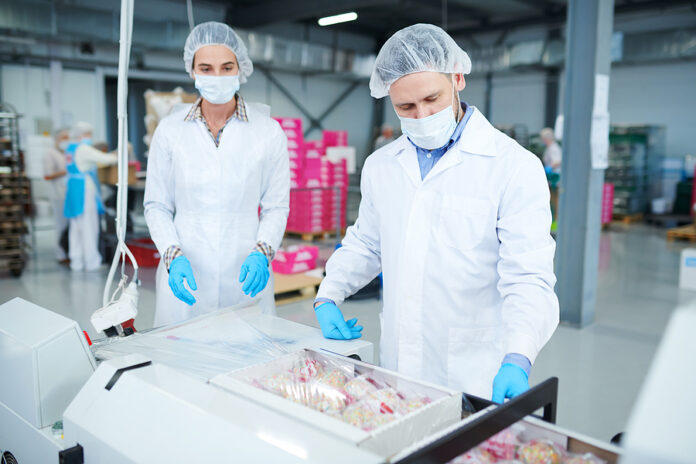
By Ryan Haines and Benjamin Esparza, safety consultants for Sentry Insurance a Mutual Company.
When viruses like COVID-19 first make news, people often ask whether it can spread through their favorite foods. Thankfully, current research shows that the risk of spreading COVID-19 through food packaging and food consumption is very low, according to CDC guidance that was issued on June 25th, 2020.
While this is welcome news throughout the industry, the health and safety of your employees and visitors should remain a top priority. Unfortunately, your business is likely managing difficult hours and modified employee workloads to limit food supply chain disruptions—leaving little time to make safety adjustments on the go.
Rest assured, we’re in this together, and as two safety consultants for Sentry Insurance, that means sharing our experiences and safety recommendations to help you create a safer workplace for employees and visitors. Here are some ideas to get you started.
Facility and employee hygiene
Safety during COVID-19 starts with hygiene, and having a thorough Hazard Analysis and Critical Control Points (HACCP) plan will be key to maintaining a clean and safe work environment. While your business may already have an existing plan in place, now is an excellent time to review your plan based on production adjustments made as a result of COVID-19.
Start by conducting a hazard assessment of your food processing facility, with a careful eye for areas that could create the highest risk of COVID-19 transmission. Consider areas such as restrooms, breakrooms, and food production lines. Once you’ve classified high-risk areas, apply strategies to allow at least six feet of distance between employees. If space is limited, encourage micro-breaks or staggered shifts to allow more room for employees to work, while giving others the opportunity to step away, adjust their masks, and wash their hands.
During your hazard assessment, you may adopt new processes to mitigate the risks of COVID-19, however these adjustments should be compared against your HACCP plan. For example, if you’ve adjusted the frequency of line inspections or incorporated new cleaning supplies, you should review how this may influence previously established upkeep schedules in your plan. After consulting members of your HACCP team, review the plan with employees to answer any questions they may have, while ensuring they understand the latest safety precautions.
To gain employee buy-in, your business should also provide the tools for proper hygiene. N-95 masks, gloves, and hand sanitizer should be available throughout your facility. Most importantly, remind employees to stay home if they are feeling sick, and maintain a list of who calls in due to illness, which could help you identify a trend before a larger outbreak occurs.
Suppliers, OEMs, and visitors
While you can assess the hygiene of your own facility and employees each day, suppliers and original equipment manufacturers (OEMs) present further challenges. In fact, Food Industry Executive’s recent survey found that traveling to conduct business on site is currently a top challenge facing OEMs and other suppliers.
Your equipment is at the center of most operations, and if you delay maintenance, your business could be increasing the likelihood of equipment breakdown or employee injury—each of which could lead to unexpected downtime. Take this into consideration when prioritizing or delaying upcoming meetings with suppliers and OEMs. If social distancing is a concern, plan meetings when your facility has a reduced number of employees or during break periods.
Before visitors arrive on site, ask them to fill out a pre-screening assessment to identify responses that may require you to reschedule or not allow a visitor into your facility. Ask visitors whether they’ve:
- Experienced unusual symptoms
- Traveled for personal or professional reasons in the past two weeks
- Been in contact with a person who has tested positive for COVID-19
In some instances, the risk versus reward may still make the decision to hold onsite meetings difficult, however other options exist. Discuss the potential for a virtual meeting with visitors and offer to provide photos or videos to OEMs if you need equipment examined. Due to the number of suppliers who visit your facility each day, a no-contact delivery location can also be a useful tool for limiting face-to-face interactions.
Travel policies
We’ve covered the challenge of visitors traveling to your facility, but what happens when your own employees need to travel? There isn’t a one-size-fits-all approach, but a thorough travel policy can help your business reduce unexpected risks.
The CDC maintains an updated list of travel recommendations and a COVID-19 data tracker, which can serve as a foundations for your essential travel policy. Afterward, gather your management team to discuss the following questions:
- Is the city or destination experiencing a spread of COVID-19?
- Will the travel and business meetings allow for social distancing?
- Does the city or destination require a two-week self-quarantine after travel?
If you ask an employee to travel after a location meets your business’s criteria, make sure they’re up to date on their vaccinations—if you require vaccines—and equipped with the proper personal protective equipment. As a bonus, provide employees with a list of local restaurants that allow drive-thru or curbside pickup to help them save time and avoid lengthened risk in public areas.
COVID-19 news will continue to develop, and as a business in the food industry, you should consult your local experts and attorney for advice and remain receptive to emerging advice from the CDC and OSHA. By establishing a culture that prioritizes health and safety now, you’ll set your employees, visitors, and business up for success well into the future. Stay safe and thank you for keeping food on our tables!

 Ryan Haines and Benjamin Esparza are safety consultants for Sentry Insurance a Mutual Company. Sentry provides insurance, retirement products, and risk management solutions for food processors and businesses. You can reach them at [email protected] and [email protected].
Ryan Haines and Benjamin Esparza are safety consultants for Sentry Insurance a Mutual Company. Sentry provides insurance, retirement products, and risk management solutions for food processors and businesses. You can reach them at [email protected] and [email protected].







